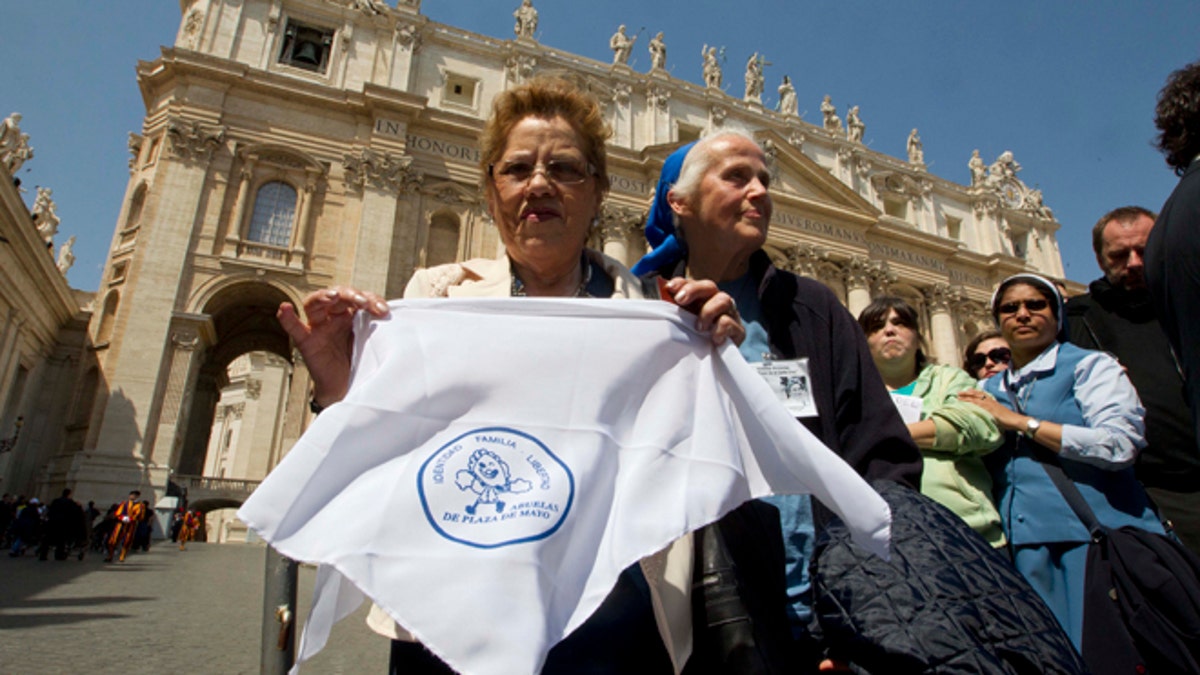
Grandmothers of the Plaza de Mayo activist Buscarita Roa, of Chile, shows a scarf with the symbol of the Grandmothers of the Plaza de Mayo association, in St. Peter's Square after meeting Pope Francis at the end of his weekly general audience at the Vatican. (AP Photo/Alessandra Tarantino) (AP2013)
VATICAN CITY – Almost 40 years ago, their grandchildren were taken from political prisoners during the country's 1976-83 military dictatorship in Argentina.
Now, members of of the Argentine human rights group "Grandmothers of the Plaza de Mayo" asked Pope Francis for help finding still-missing children— and said the pontiff told them they could count on him.
Estela de Carlotto, president of the group, met briefly with the Argentinean pope after Francis' general audience in St. Peter's Square. She handed him a written request that he authorize the opening of archives from the Vatican and the Catholic Church in Argentina in hopes of finding clues about the whereabouts of the children.
The organization estimates that around 500 babies were taken from their mothers while they were detained by the military.
We ask that they help us, open the archive and investigate who was responsible in the church for the abduction of our grandchildren.
"Every detail can help to identify those who were taken from our families," the letter read.
"We ask that they help us, open the archive and investigate who was responsible in the church for the abduction of our grandchildren," de Carlotto told a news conference. She told reporters that Francis had told her: "'You can count on me. You can count on us.'"
The former Jorge Mario Bergoglio was the young head of the Jesuit order in Argentina during the initial years of the dictatorship. In 1998, he was named archbishop of Buenos Aires and the country's top churchman — a position he held until he was named pope last month.
Under Bergoglio's leadership, Argentina's bishops issued a collective apology in October 2012 for the church's failures to protect its flock. But the statement blamed the era's violence in roughly equal measure on both the junta and its enemies.
The babies — some were abducted along with their parents, others were born in captivity — were mainly given to army families or supporters of the military regime, according to a government report titled "Never Again." In many cases, the infants' names were changed.
The "Grandmothers" group has been marching every Thursday since 1977 in the Plaza de Mayo, the main square in front of Argentina's Government House, to demand answers about the whereabouts of the missing.
"They know where these children can be found," de Carlotto said of church authorities. She said she was satisfied with her brief meeting with the pope but criticized him for not speaking out about the "disappeared" during the dictatorship.
Bergoglio, like most other Argentines, didn't openly confront the military junta as it kidnapped and killed thousands of people in a "dirty war" to eliminate leftist opponents. But human rights activists differ on how much responsibility Bergoglio himself bears given he was just a young priest in charge of a few hundred Jesuits at the time, not the Catholic Church's main representative in the country.
The request to open the Vatican archives is somewhat fraught: Vatican archives are sealed for decades after a pontificate and are opened only after they have been catalogued. Vatican archivists are currently working at an accelerated pace to open the archives of Pope Pius XII amid charges from some Jewish groups that the World War II-era pontiff didn't speak out enough against the Holocaust.
Based on reporting by The Associated Press.
Follow us on twitter.com/foxnewslatino
Like us at facebook.com/foxnewslatino
